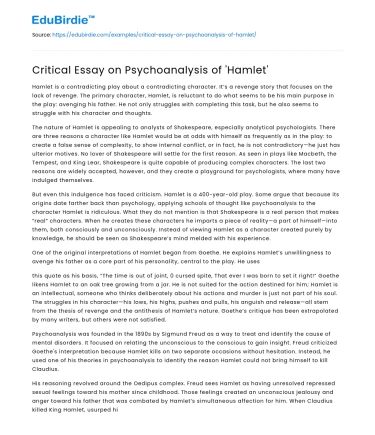Hamlet is a contradicting play about a contradicting character. It’s a revenge story that focuses on the lack of revenge. The primary character, Hamlet, is reluctant to do what seems to be his main purpose in the play: avenging his father. He not only struggles with completing this task, but he also seems to struggle with his character and thoughts.
The nature of Hamlet is appealing to analysts of Shakespeare, especially analytical psychologists. There are three reasons a character like Hamlet would be at odds with himself as frequently as in the play: to create a false sense of complexity, to show internal conflict, or in fact, he is not contradictory—he just has ulterior motives. No lover of Shakespeare will settle for the first reason. As seen in plays like Macbeth, the Tempest, and King Lear, Shakespeare is quite capable of producing complex characters. The last two reasons are widely accepted, however, and they create a playground for psychologists, where many have indulged themselves.
Save your time!
We can take care of your essay
- Proper editing and formatting
- Free revision, title page, and bibliography
- Flexible prices and money-back guarantee
But even this indulgence has faced criticism. Hamlet is a 400-year-old play. Some argue that because its origins date farther back than psychology, applying schools of thought like psychoanalysis to the character Hamlet is ridiculous. What they do not mention is that Shakespeare is a real person that makes “real” characters. When he creates these characters he imparts a piece of reality—a part of himself—into them, both consciously and unconsciously. Instead of viewing Hamlet as a character created purely by knowledge, he should be seen as Shakespeare’s mind melded with his experience.
One of the original interpretations of Hamlet began from Goethe. He explains Hamlet’s unwillingness to avenge his father as a core part of his personality, central to the play. He uses
this quote as his basis, “The time is out of joint, 0 cursed spite, That ever I was born to set it right!” Goethe likens Hamlet to an oak tree growing from a jar. He is not suited for the action destined for him; Hamlet is an intellectual, someone who thinks deliberately about his actions and murder is just not part of his soul. The struggles in his character—his lows, his highs, pushes and pulls, his anguish and release—all stem from the thesis of revenge and the antithesis of Hamlet’s nature. Goethe’s critique has been extrapolated by many writers, but others were not satisfied.
Psychoanalysis was founded in the 1890s by Sigmund Freud as a way to treat and identify the cause of mental disorders. It focused on relating the unconscious to the conscious to gain insight. Freud criticized Goethe's interpretation because Hamlet kills on two separate occasions without hesitation. Instead, he used one of his theories in psychoanalysis to identify the reason Hamlet could not bring himself to kill Claudius.
His reasoning revolved around the Oedipus complex. Freud sees Hamlet as having unresolved repressed sexual feelings toward his mother since childhood. Those feelings created an unconscious jealousy and anger toward his father that was combated by Hamlet’s simultaneous affection for him. When Claudius killed King Hamlet, usurped his position, and also had an obvious incestuous relationship with his mother, it took away that affection but also “shows him the repressed wishes of childhood realized”. Because of this, when he should feel hate and a drive toward the murder of Claudius, he feels deep regret and an extremely guilty conscious. In actuality, killing Claudius would be killing the deepest darkest parts of himself, which he is not willing to do. Only when Gertrude is dead is he able to bring himself to finish the deed. Tens if not hundreds of critiques have gone deeper into the Freudian psychoanalysis of Hamlet, working out inconsistencies and tying in other characters.
Carl Jung is a psychologist who worked with Freud but eventually separated and developed his theories and school of psychotherapy called analytical psychology. One personality identification he created was a binary system of 3 categories: extraversion and introversion, thinking and feeling, and intuition and sensation. He declared that each person has a dominant function that is an expression of their conscious personality—its goals, drive, and performance. Jungian psychology can use this to explain some interactions between characters at least on a semi-shallow level. Hamlet's relationship with Gertrude is mother and son, but beyond that, they are also opposite personality types. Hamlet is an introvert who, as apparent in the play, thinks by relating concepts and laws. Gertrude on the other hand is an extrovert who is not concerned with intellectually relating her judgments as much as using her criteria to accept or reject. Understanding their differences can provide context to their actions.






 Stuck on your essay?
Stuck on your essay?

